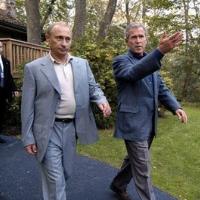On Sept. 8, U.S. Secretary of State Condoleezza Rice announced the most concrete U.S. punishment of Russia for Moscow's military intervention in Georgia. In a brief press release, she related that President Bush was rescinding the proposed U.S.-Russia Agreement for Peaceful Nuclear Cooperation. She expressed regret at the decision, but described it as inevitable since, "given the current environment, the time is not right for this agreement." Although Vice President Richard Cheney has denounced "Russia's actions [as] an affront to civilized standards" and said they are "completely unacceptable," the Bush administration had until this decision not penalized Russia so directly for its invasion of Georgia. Instead, it had focused more on providing political, financial, and other assistance to Georgia. By recalling the proposed nuclear pact from Congress, the administration is depriving Russia of billions of dollars of potential revenue from new commercial nuclear activities. President George W. Bush and then Russian President Vladimir Putin originally announced their intent to negotiate a U.S.-Russia Agreement for Peaceful Nuclear Cooperation (known as a "123 Agreement") at their joint news conference held on the sidelines of the July 2006 G-8 summit in St. Petersburg. Section 123 of the 1954 Atomic Energy Act (pdf) requires the United States to negotiate a separate bilateral accord with each country before they can cooperate on commercial nuclear projects. The terms of these agreements typically require American approval before a recipient conducts uranium enrichment or reprocessing using U.S.-provided nuclear material and equipment furnished under the agreement or transfers these items to a third party.
Bush Administration Abandons Nuclear Pact with Russia

